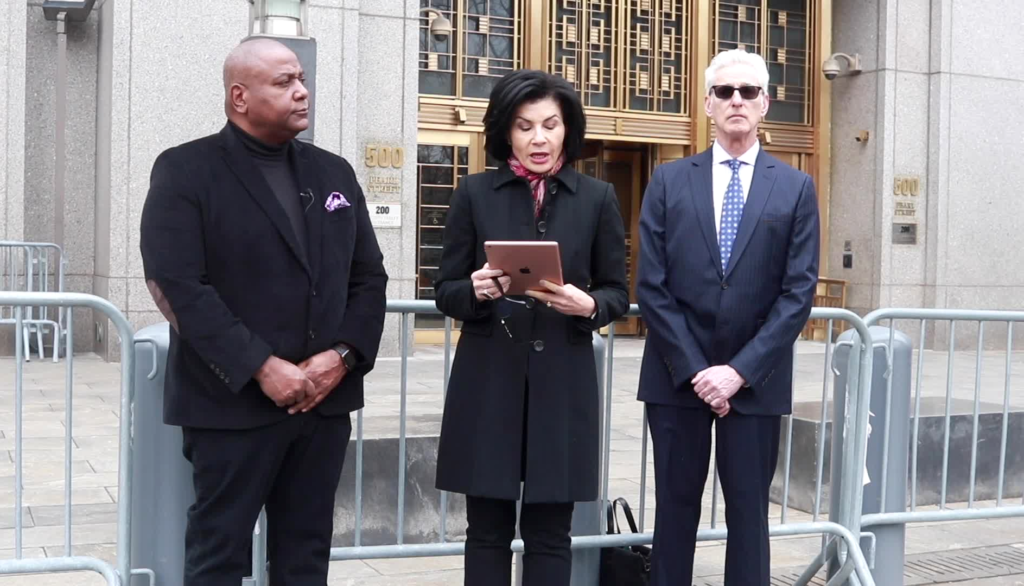After Resigning, Jami Floyd Plans to Sue WNYC for Discrimination
New York Public Radio has retracted more than 45 stories written by the former director of its Race and Justice Unit for plagiarism
The morning after Jami Floyd, the former director of WNYC’s Race and Justice Unit, resigned after internal investigations found that she had authored more than 45 stories with plagiarized material, a small group gathered in front of a federal courthouse in downtown Manhattan for what Floyd had called on Facebook a “newsworthy press conference” in which she announced plans to sue the public radio station. Accompanying Floyd was her spokesperson, Mike Paul, the founder of the public relations firm Reputation Doctor, and a lawyer later identified as one of her civil rights attorneys, Kurt Flehinger. Both stood by silently, hands clasped in front of them, as Floyd read a prepared speech from an iPad in a pink case.
“At WNYC, we still have bullies in the building,” said Floyd, occasionally making eye contact with the four journalists in front of her, recording her speech on their iPhones and dangling awkwardly off of the curb. “I know this from personal experience. They bullied me, harassed me, hazed me from the day I walked through the door in 2015.” Floyd began at WNYC as a freelancer in 2009 and became a local host of the show All Things Considered in 2015. “I’m not the first Black woman who was victimized at New York Public Radio,” Floyd said, “but I am determined to be the last Black woman who cannot have a long and successful career at New York Public Radio.”
Floyd also said, “I’m standing in front of the federal courthouse because I plan to file suit against WNYC, New York Public Radio for race discrimination, gender discrimination, age discrimination, retaliatory workplace harassment, defamation, and violation of my civil rights.” Floyd said she had declined to sign a separation agreement which would have included a confidentiality provision and severance, which a WNYC spokesperson confirmed was accurate.
Paul, dressed in a black turtleneck, black blazer, and a purple pocket square, nodded in agreement, then held up his hand to stop an elderly pedestrian and their companion from passing in front of the press conference. The passersby continued walking, lost in conversation.

Floyd’s remarks were occasionally drowned out by the sound of traffic on Pearl Street, a few minutes away from City Hall. Both Paul and Flehinger pointedly shushed a man who attempted to interrupt the press conference at various points by heckling Floyd. “You want to talk about diversity?” the man shouted. Flehinger, wearing a blue pin-striped suit and transition glasses, stepped over to the man and said quietly, “Let’s talk about this after.”
The retracted articles were not mentioned until after Floyd’s speech when Paul took questions from the assembled reporters. “The only comment about the 45 so-called instances is simply this,” Paul said. “Can you believe that Ms. Floyd has not seen any of them? She has not had the opportunity to review any of them. That adds a little difference to the story that’s been reported to date.” Floyd shook her head in agreement, telling the reporter who asked about the plagiarism allegations, “I have no idea what you’re talking about.”
A source familiar with the internal review told The Fine Print on Monday that Floyd had been informed last week that an internal review of her work was “likely to confirm dozens of instances of misattributed words and phrases.” Following a New York Times story last November about the earlier retraction of four of her stories, a statement by Floyd posted on Reputation Doctor said she was “mortified” and “devastated” about plagiarism discovered in her stories and that she had contacted each of the authors of the articles she had plagiarized to apologize.
At Tuesday’s press conference, Floyd, who is Black, read excerpts of messages from people she said were Black WNYC employees who decided to leave the station because of a hostile work environment—echoing long-standing frustrations about newsroom diversity and reports of a toxic work culture at WNYC, whose editor-in-chief and chief content executive are both white. Floyd claimed there are currently no Black reporters in the WNYC newsroom despite her efforts to recruit and hire Black journalists for the Race and Justice unit.
“This is a city that is almost three quarters of people of color,” said Paul after Floyd concluded her remarks. “To have no reporters currently in the newsroom of any kind is an abomination.”
A spokesperson for WNYC said, “The newsroom leadership is 60 percent POC. In the last 18 months, the newsroom promoted a Black reporter to editor, promoted Jami to direct the Race and Justice Unit, hired two Black editors and two Black hosts.”
Last Friday, the same day that 45 of Floyd’s articles were removed for misattributed content, Publisher’s Weekly reported that Floyd sold a book about the life and career of Thurgood Marshall to Little, Brown. Speaking around the corner from the Thurgood Marshall U.S. Courthouse in Foley Square, Floyd cited the first Black Supreme Court Justice several times in her remarks. “As many people know, he’s my lifelong hero. He was a freedom fighter,” Floyd said. When Paul spoke, he said the book project is just “one of the big opportunities she left” WNYC for.
As the press conference came to a close and the other journalists and onlookers dispersed, Paul approached this reporter. “Hopefully you can see that this adds another side to the story,” he said, raising his eyebrows, before returning to Floyd and Flehinger and walking away with them.
